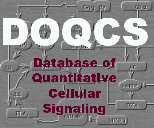
|
Enter a Search String | | Special character and space not allowed in the query term.
Search string should be at least 2 characters long. |
Molecule Parameter List for 1345_3pase | The statistics table lists the distribution of a molecule acting either as a substrate, product, enzyme or as a molecule within the network.
The text color of a molecule is highlighted by  color. color. | | Statistics |
Accession and Pathway Details | |
| Accession Name | Accession No. | Accession Type | Pathway Link | Osc_Ca_
IP3metabolism | 32 | Network |
MIPP, CaMKII, CaM,
PKC, IP3-3K, Gq,
PLCbeta, 134_dephos, 145_dephos,
IP4-system, IHP-system, 1345_dephos,
CaRegulation, Othmer-Tang-model | | This network models an oscillatory calcium response to GPCR mediated PLCbeta activation, alongwith detailed InsP3 metabolism in the neuron. It is similar to the Osc_Ca_IP3metab model (accession 24) except that some enzymes in the InsP3 metabolism network have been modified to have reversible kinetics rather than Michaelis-Menten kinetics. The modified enzymes belong to the groups: IP4-system, IP3-3K, 145_dephos and 134_dephos. Mishra J, Bhalla US. Biophys J. 2002 Sep;83(3):1298-316. |
1345_3pase acting as a Molecule in Osc_Ca_IP3metabolism Network
| Name | Accession Name | Pathway Name | Initial Conc.
(uM) | Volume
(fL) | Buffered | | 1345_3pase | Osc_Ca_
IP3metabolism
Accession No. : 32 | 1345_dephos
Pathway No. : 169 | 0.1 | 1000 | No | | from Hoer et al, BiochemJ 270; 1990: 715-719 |
1345_3pase acting as an Enzyme in Osc_Ca_IP3metabolism Network
Enzyme Molecule /
Enzyme Activity | Accession Name | Pathway Name | Km (uM) | kcat (s^-1) | Ratio | Enzyme Type | Reagents | 1345_3pase /
ip4_3pase
| Osc_Ca_
IP3metabolism
Accession No. : 32 | 1345_dephos
Pathway No. : 169 | 0.400007 | 0.0012 | 4 | explicit E-S complex | Substrate
IP4(1345)
Product
IP3(145)
| | Ins(1345)P4 3-phosphatase from Nogimori et al, JBC 266; 1991 |
1345_3pase acting as a Substrate in a reaction in Osc_Ca_IP3metabolism Network
| Kd is calculated only for second order reactions, like nA+nB <->nC or nA<->nC+nD, where n is number and A,B,C,D are molecules, where as for first order reactions Keq is calculated.
Kd for higher order reaction are not consider. |
| Database compilation and code copyright (C) 2022, Upinder S. Bhalla and NCBS/TIFR
This Copyright is applied to ensure that the contents of this database remain freely available. Please see FAQ for details. |
|
